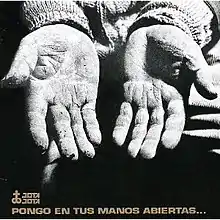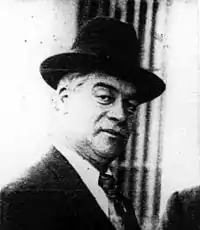Pongo en tus manos abiertas
Pongo en tus manos abiertas ("I Put Into Your Open Hands") is the fourth studio album recorded by the Chilean singer-songwriter Víctor Jara with musicians from Quilapayún in June, 1969. It was the third album released by the DICAP record label.[2]
| Pongo en tus manos abiertas | ||||
|---|---|---|---|---|
 | ||||
| Studio album by | ||||
| Released | June 1969 | |||
| Recorded | 1969 | |||
| Venue | Santiago, Chile | |||
| Genre | Folk music Protest music Nueva canción | |||
| Length | 41:23 | |||
| Label | DICAP Warner Bros. Records | |||
| Producer | Víctor Jara | |||
| Víctor Jara chronology | ||||
| ||||
| Review scores | |
|---|---|
| Source | Rating |
| Allmusic | |
In April 2008, the magazine Rolling Stone Chile ranked this album in fifth place within the 50 best Chilean albums of all time.[3]
Composition
The album includes songs written by Jara like "A Luis Emilio Recabarren", a song tribute to the founder of the Communist Party of Chile, Luis Emilio Recabarren,[4] and on other hand include Jara's versions from songs "A desalambrar" and "Camilo Torres" (a tribute song to the Colombian priest of the same name), both are by Uruguayan composer Daniel Viglietti. The album also include Latin American lullaby, "Duerme, duerme negrito", collected by Atahualpa Yupanqui,[5] "Juan Sin Tierra", a tribute song to the Mexican revolutionary Emiliano Zapata written by Jorge Saldaña and sung by Víctor Jara.[6] "If I Had a Hammer" written by Lee Hays and Pete Seeger and retitled "El Martillo",[1] "Zamba del Che", a tribute song to the Argentine guerrilla Che Guevara, composed in 1967 by Mexican Rubén Ortiz Fernández,[7] and "Ya parte el galgo terrible", written by Sergio Ortega and Pablo Neruda.[8]
"Preguntas por Puerto Montt" is a song commenting Puerto Montt massacre, Chile,[1] in March 9, 1969. Jara condemns the then Christian Democrat Minister of the Interior Edmundo Pérez Zujovic, one of the main authors of the massacre and for the death of 11 men, women, and children during the massacre of Puerto Montt.[9] The album contained "Te recuerdo amanda" ("I remember you Amanda"), one of Víctor Jara most famous songs,[10] which has been adapted to various languages and interpreted by various artists from all over the world such as Joan Baez, Robert Wyatt, Raimon and Cornelis Vreeswijk.
Liner notes

I PUT IN YOUR OPEN HANDS…
Laughter and blows,
Hope and protest.
A shout emerges crossing the large expanse of our territory.
It is the peasant nailing a plough on the land,
the worker filling the air with protest on May Day,
the student and his word
in street battles,
the youth,
that for being young,
cannot but look forward into the future.
And all this is present
in the youth that struggles
and in the song of protest.
The new song of Victor Jara unites,
from his position as activist of the people’s cause,
the spirit of the young generation of our land,
the lengthy tradition of the workers struggles
the awaken conscious of the artist
which is identified more than compromised with the people.
During these days in which the Communist Youth
gather for their VI Congress
to reassert their decision to receive the message
which places in their “OPEN HANDS”
the visionary father of the New Homeland,
Luis Emilio Recabarren.
We also place in the open hands
of all the Chilean youth
These songs that speak to us
about our convictions,
our hopes
of ourselves.
Track listing
Side A
All tracks are written by Víctor Jara, except where indicated.
| No. | Title | Writer(s) | Length |
|---|---|---|---|
| 1. | "A Luis Emilio Recabarren" | 2:49 | |
| 2. | "A desalambrar" | Daniel Viglietti, versioned by Víctor Jara | 1:36 |
| 3. | "Duerme, duerme negrito" | Latin American lullaby, versioned by Víctor Jara | 2:49 |
| 4. | "Juan sin Tierra" | Jorge Saldaña, versioned by Víctor Jara | 3:09 |
| 5. | "Preguntas por Puerto Montt" | 2:39 | |
| 6. | "Móvil Oil Special" | 2:46 | |
| Total length: | 14:28 | ||
Side B
| No. | Title | Writer(s) | Length |
|---|---|---|---|
| 1. | "Camilo Torres" | Daniel Viglietti, versioned by Víctor Jara | 3:04 |
| 2. | "El Martillo" | Lee Hays and Pete Seeger, versioned by Víctor Jara | 2:49 |
| 3. | "Te recuerdo amanda" | 2:33 | |
| 4. | "Zamba del Che" | Rubén Ortiz Fernández | 3:39 |
| 5. | "Ya parte el galgo terrible" | Sergio Ortega and Pablo Neruda, versioned by Víctor Jara | 1:50 |
| 6. | "A Cochabamba me voy" | 2:26 | |
| Total length: | 16:27 | ||
2001's extended version
Re-release from March, 2001 by Warner
All tracks are written by Víctor Jara.
| No. | Title | Writer(s) | Length |
|---|---|---|---|
| 1. | "Plegaria a un Labrador" (a Single version what Víctor Jara composed with the group Quilapayun.) | Víctor Jara & Patricio Castillo | 3:02 |
| 2. | "Cueca de Joaquín Murieta" | 1:36 | |
| 3. | "Tonada para guitarra" (Version in live at the "Peña de los Parra" of 1970.) | 1:14 | |
| 4. | "Te Recuerdo Amanda" (Version in live at the "Peña de los Parra" of 1970.) | 3:06 | |
| 5. | "Plegaria a un Labrador" (Version in live at the "Peña de los Parra" of 1970.) | Víctor Jara & Patricio Castillo | 3:32 |
| 6. | "El arado" (Version in live of 1970.) | 3:48 | |
| Total length: | 16:22 | ||
Bibliography
- Jara, Joan. (1983). Victor: An Unfinished Song. Jonathan Cape Ltd. ISBN 0-224-01880-9
References
- "Pongo en Tus Manos Abiertas - Victor Jara | Songs, Reviews, Credits". AllMusic. Retrieved 20 February 2021.
- Discoteca del Cantar Popular (Record Label of Popular Song) was a record label established by the Communist youth that would issue music albums that commercial record companies were not prepared to release in Chile at the time.
- "Los 50 Mejores Discos Chilenos - RYM/Sonemic". Rate Your Music: rateyourmusic.com. Retrieved 20 February 2021.
- Rodríguez, Juan Pablo González; Vásquez, Oscar Ohlsen; Cruz, Claudio Rolle. Historia social de la música popular en Chile, 1950- 1970 (in Spanish). Ediciones UC. ISBN 978-956-14-2632-0. Retrieved 12 July 2021.
- Carreño Bolivar, Rubí. (2017). La rueda mágica (in Spanish). Santiago de Chile: Editorial Universidad Alberto Hurtado. ISBN 978-956-357-108-0. Retrieved 12 July 2021.
- "Víctor Jara - Juan Sin Tierra". Antiwar Songs (AWS). Retrieved 15 July 2021.
- Tello, Judith Amador (21 July 2020). "Evocación de Rubén Ortiz y su famosa 'Zamba del Che". Proceso (in Spanish). Retrieved 14 July 2021.
- "Ya parte el galgo terrible (Pablo Neruda - Sergio Ortega)". Cancioneros.com. Retrieved 12 July 2021.
- Jara, Joan (1983), pp.124-125
- ""Letra y Música" y el legado musical y político de Víctor Jara, a 47 años de su asesinato". ADN (in Spanish). 17 September 2020. Retrieved 15 July 2021.
- Liner notes that appeared on the original DICAP Pongo en tus manos abiertas release in June, 1969. "Archived copy". Archived from the original on 2007-05-01. Retrieved 2011-10-13.
{{cite web}}: CS1 maint: archived copy as title (link)